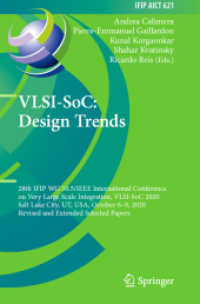- ホーム
- > 洋書
- > 英文書
- > Business / Economics
Full Description
This book explores accounting and accountability for social inclusion through interdisciplinary perspectives. It begins by examining the potential of accounting and accountability to mediate in various areas, analyzing the dialogue among accounting, accountability, and other theories to contribute to social inclusion and foster a more sustainable society. The book delves into the interplay between accounting, accountability, and Nature-Based Solutions (NBS), and social inclusion, as well as the roles of technological innovation and artificial intelligence in promoting social inclusion. Additionally, it considers the anthropological and ethical foundations of accounting, accountability, and social inclusion.
The book is divided into three parts. The first part provides a general overview, proposing theoretical frameworks aimed at evaluating and measuring social inclusion, and encouraging accounting and accountability in sustainable, innovative business models. The second part focuses on empirical experiences in specific sectors, such as cultural institutions. The third part is dedicated to the interdisciplinary dialogues for social inclusion involving marginalized communities and best practice in higher education.
The book offers guidance on selecting among major worthy causes and measuring the beneficial outcomes achieved for both recipients and socially responsible entities. It is intended for practitioners, researchers, and senior undergraduate and graduate students in business, accounting, accountability, ethics, corporate social responsibility, sustainability, social inclusion, and management courses. Students in related disciplines such as economics, social sciences, and humanities will also find it valuable.
Contents
The "potential" of accounting and accountability in the current Economic System towards an emancipatory change.- Defining accounting and accountability for sustainability and social inclusion.- Sustainability reporting tools and social inclusion evaluation: conceptual network.- Theoretical perspectives and approaches for social inclusion in cultural Institutions.- Nature Based-Solutions to evaluate Social Inclusion in Tactile Museum.- Social Inclusion and Technological Innovations in Tactile Museum accounting and management.- The state of art about the implementation of social and environmental sustainability drivers in micro and small enterprise in an Italian Region.- The social and inclusive accounting perspective of Economy of Communion: firm research cases.- Multidimensional Model for Social Tagging of Environmental Investment Costs (STEIC).- Accounting and Economic Inclusion: Transparency, Innovation, and Social Impact in Marginalized Communities.- Developing Sustainability Reporting in the pioneer case Study of Beach Establishments in Italy: first results.- Social inclusion in high education: accountability practices and challenges in ex transition country.








